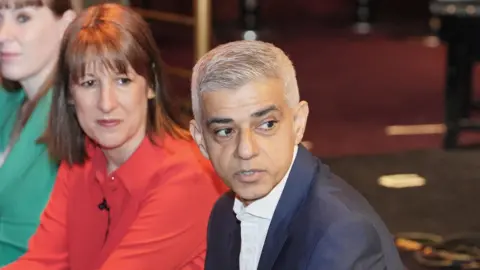In recent developments regarding the expansion of Heathrow Airport, Mayor of London, Sir Sadiq Khan, is taking a proactive stance by consulting legal advisors in response to the government’s plans for a third runway, which he opposes. This move has potential implications as it positions the mayor on a collision course with his party, following supporting remarks from Chancellor Rachel Reeves, who advocates for the expansion as a catalyst for economic growth. The situation highlights a notable tension within the Labour Party, as Khan raises concerns about noise pollution, air quality, and climate change associated with the proposed development.
Khan’s objections to the Heathrow expansion are well-known, and his legal consultations mark a significant step in his efforts to challenge the project. The mayor emphasizes the potential adverse effects on the environment, warning that the proposed expansion could undermine efforts to combat climate change, a key concern for many urban leaders today. Reeves’ recent promotion of the project, promising to eliminate hurdles for development, contrasts sharply with Khan’s apprehensions, thus underscoring the schisms within the party concerning essential environmental policies and urban development.
The plans for expanding Heathrow’s runway dates back to 2006 but are still catching fire with renewed political fervor. The airport authority aims for the new runway to be functional by 2035, a timeline that both generates anticipation and sparks ongoing debate. As Khan pursued legal advice, it became clear that this issue is heating up, especially after Reeves voiced her support earlier this year, leading to an internal conflict as the government pushes forward despite opposition from significant figures within the party.
Legal advisories sought by Khan on January 24th, shortly after the Chancellor’s endorsement of expansion, reflect a strategy to prepare for potential challenges that may arise as the formal proposals are submitted. As the summer approaches, Heathrow is expected to release initial expansion plans, which will then be scrutinized by the Planning Inspectorate and transport secretary before any construction can commence. As the mayor has publicly stated, he intends to be diligent in reviewing these plans, maintaining a skeptical stance on whether they can be implemented without harming the environment.
There’s a certain level of tension among Labour’s ranks regarding the future implications of such legal actions. A government source acknowledged the peculiar situation of a prominent Labour figure potentially mounting legal challenges against government-backed proposals. However, this source downplayed concerns over Khan’s opposition, noting that the proposed timelines of the project mean it is likely he may not be in office by the time any battles have to be fought. This pragmatism reinforces the lengthiness of bureaucratic processes involved in such substantial urban undertakings.
Khan’s articulated hesitations resonate with a broader societal concern regarding sustainable development. A spokesperson reiterated his commitment against the new runway due to its anticipated adverse environmental impact. Concurrently, responses from government representatives indicate a firm commitment to minimize the opportunities for legal challenges against the expansion. This determination illustrates the administration’s stance that such growth is integral to the future of trade, tourism, and economic recovery in the UK.
In conclusion, the proposed expansion of Heathrow Airport continues to evoke significant political and environmental discourse. As Mayor Khan prepares to legally contest these developments, the unfolding scenario reveals deeper ideological divides within the Labour Party and highlights the critical balance between economic aspirations and environmental stewardship. With growing scrutiny on climate change, the coming months will be pivotal as both the Heathrow proposals and Khan’s resistance unfold, potentially reshaping London’s transport landscape for the future.



